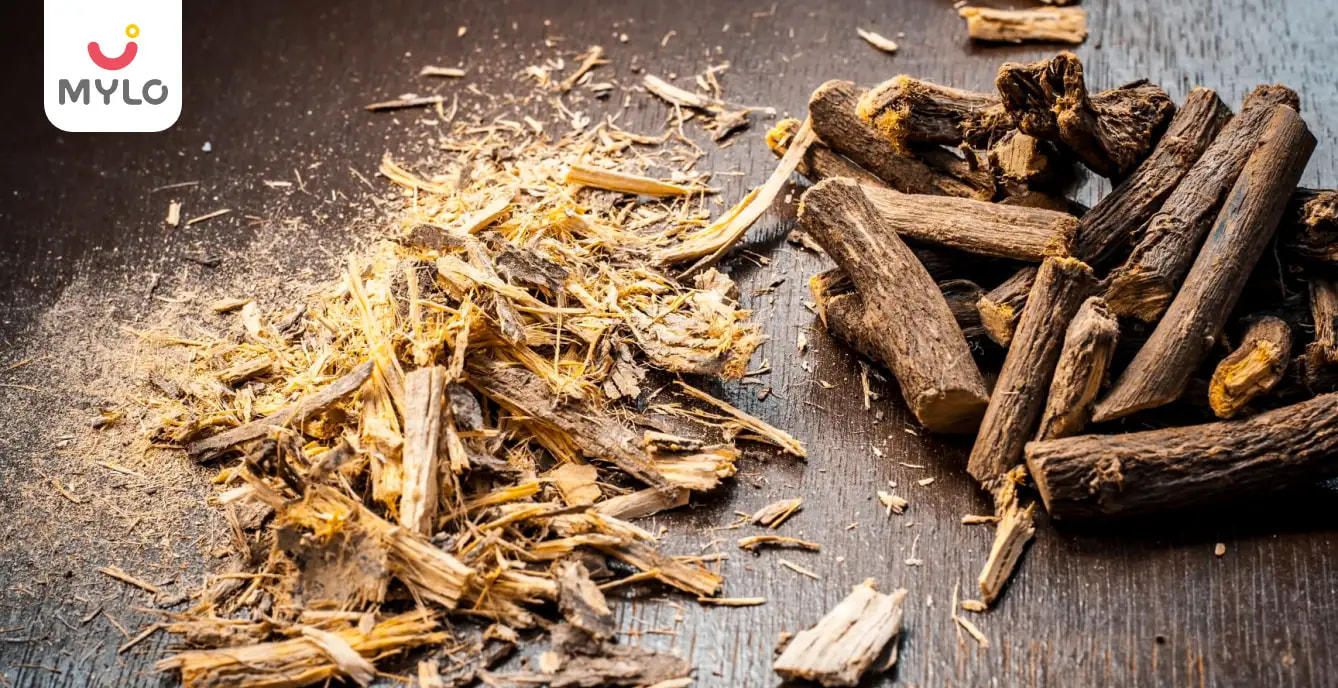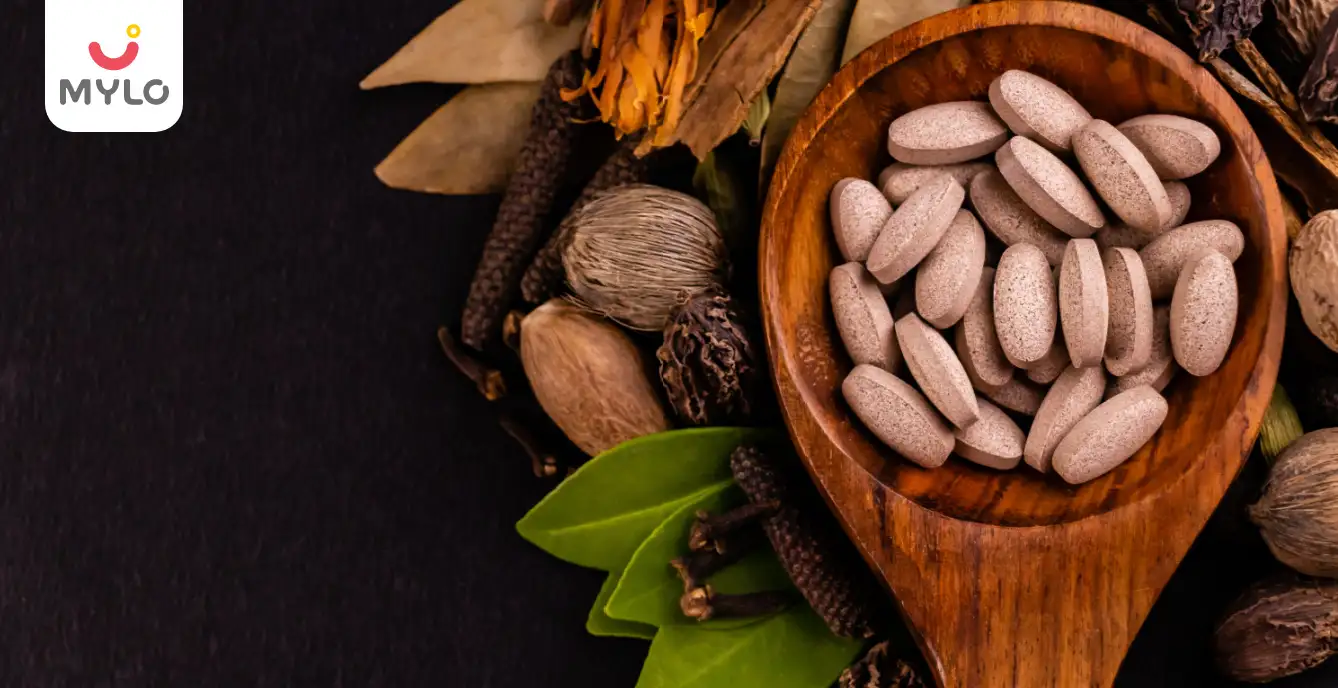Home

Ayurveda & Homepathy

Mulethi: Unraveling the Therapeutic Potential of Licorice Root for Your Overall Health
In this Article

Ayurveda & Homepathy
Mulethi: Unraveling the Therapeutic Potential of Licorice Root for Your Overall Health
Updated on 11 July 2023
Mulethi, also known as Licorice, has been revered for centuries for its myriad of health benefits and its rich cultural significance. But are you aware of the incredible therapeutic potential of this herb for your overall health?
Join us as we unravel the secrets behind this powerful herb, exploring its traditional uses, modern scientific findings, and how you can incorporate it into your daily routine to enhance your well-being. So, let's embark on this enlightening journey and discover the wonders of licorice root together!
What is Mulethi?
Mulethi, also known as licorice root, is a herb that has been used for centuries in traditional medicine practices. It is derived from the root of the Glycyrrhiza glabra plant, which is native to the Mediterranean and parts of Asia. Mulethi powder has a distinct sweet flavor and is commonly used as a natural sweetener in various culinary preparations. However, its benefits go far beyond just adding sweetness to your dishes.
What are Some Common Mulethi Benefits?
Here are some common benefits of Mulethi:
1. Improves Immunity
One of the key benefits of mulethi is its ability to boost the immune system. It contains compounds that have been found to enhance the production of immune cells, such as lymphocytes and macrophages. These cells play a crucial role in fighting off infections and diseases, making mulethi a valuable addition to your daily routine, especially during flu seasons.
Furthermore, mulethi has been found to possess antimicrobial properties, which can help inhibit the growth of harmful bacteria and viruses. By incorporating mulethi powder into your diet, you can strengthen your immune system and reduce the risk of falling ill.
2. Reduces Inflammation
Inflammation is a natural response by the body to protect itself from injury or infection. However, chronic inflammation can lead to various health problems, including heart disease, arthritis, and certain types of cancer. Mulethi has been found to possess anti-inflammatory properties that can help reduce chronic inflammation in the body.
The active compounds in mulethi, such as glycyrrhizin and liquiritin, have been shown to inhibit the production of inflammatory molecules. By including it in your diet, you can potentially alleviate symptoms of inflammation and promote overall health and well-being.
3. Regulates Hormone Levels
Hormonal imbalances can lead to a range of health issues, including irregular menstrual cycles, fertility problems, and mood swings. Mulethi has been used in traditional medicine to help regulate hormone levels in the body.
Research has shown that mulethi contains compounds that have estrogen-like effects, which can help balance hormone levels in women. This can be particularly beneficial for those experiencing menopausal symptoms or hormonal imbalances.
In addition to its impact on female hormones, mulethi has also been found to support the production of testosterone, the primary male hormone. By maintaining hormonal balance, mulethi can contribute to overall health and vitality.
You may also like : Perimenopause: Causes, Symptoms, Risks & Treatment
4. Supports Digestive Health
Mulethi has long been used as a natural remedy for digestive issues. It has been found to possess antispasmodic properties, which can help relax the muscles of the digestive tract and alleviate symptoms of indigestion, bloating, and abdominal pain.
Furthermore, mulethi has been shown to promote the production of mucus in the digestive system. This mucus acts as a protective barrier, preventing damage from stomach acid and reducing the risk of ulcers.
By incorporating mulethi into your daily diet, you can support your digestive health and improve overall well-being.
5. Protects Liver
The liver is responsible for detoxifying the body and removing harmful substances. However, factors such as a poor diet and excessive alcohol consumption can put a strain on the liver and lead to liver damage.
Mulethi has been found to possess hepatoprotective properties, meaning it can help protect the liver from damage and promote its regeneration. The active compounds in mulethi, such as glycyrrhizin, have been shown to reduce inflammation and oxidative stress in the liver, which can contribute to improved liver health.
By incorporating mulethi into your daily routine, you can support your liver function and reduce the risk of liver-related diseases.
6. Treats Ulcers
Peptic ulcers are painful sores that develop in the lining of the stomach or the upper part of the small intestine. They can cause symptoms such as abdominal pain, bloating, and nausea.
Mulethi has been used in traditional medicine to treat peptic ulcers due to its anti-inflammatory and anti-ulcer properties. It can help reduce inflammation in the stomach lining and promote the healing of ulcers.
By consuming mulethi powder or tea, you can potentially alleviate symptoms of peptic ulcers and support the healing process.
7. Boosts Respiratory Health
Mulethi has been used for centuries as a natural remedy for respiratory conditions such as cough, cold, and asthma. It contains compounds that have expectorant and bronchodilator effects, meaning they can help loosen mucus and open up the airways.
Research has shown that mulethi can help reduce symptoms of respiratory conditions, such as coughing and wheezing. It can also help soothe irritated throat and reduce inflammation in the respiratory tract.
By incorporating mulethi into your diet or consuming it in the form of tea, you can support your respiratory health and alleviate symptoms of respiratory conditions.
8. Enhances Skin Health
Mulethi has been used topically for centuries to promote healthy skin. It contains compounds that have antioxidant and anti-inflammatory properties, which can help protect the skin from damage and reduce the risk of skin conditions such as acne and eczema.
Furthermore, mulethi has been found to inhibit the production of melanin, the pigment responsible for skin darkening. This can help lighten dark spots and promote a more even skin tone.
By using skincare products containing mulethi extract or consuming mulethi internally, you can support your skin health and achieve a radiant complexion.
9. Regulates Blood Sugar Levels
Maintaining stable blood sugar levels is essential for overall health, especially for individuals with diabetes. Mulethi has been found to possess antidiabetic properties that can help regulate blood sugar levels.
The active compounds in mulethi, such as glycyrrhizin, have been shown to enhance insulin sensitivity and reduce blood sugar levels. This can be particularly beneficial for individuals with type 2 diabetes or those at risk of developing the condition.
By incorporating mulethi into your diet, you can potentially improve your blood sugar control and reduce the risk of complications associated with diabetes.
10. Promotes Healthy Heart
Heart disease is a leading cause of death worldwide. Maintaining a healthy heart is crucial for overall well-being. Mulethi has been found to possess cardioprotective properties that can help support heart health.
The active compounds in mulethi, such as flavonoids and glycyrrhizin, have been shown to reduce cholesterol levels, lower blood pressure, and improve blood vessel function. This can help reduce the risk of heart disease and promote cardiovascular health.
By incorporating mulethi into your daily routine, you can support your heart health and reduce the risk of heart-related complications.
Also read : 5 Steps to a Healthy Lifestyle: The Blueprint for Your Wellness Journey
How to Incorporate Mulethi Powder Into Your Daily Diet?
There are several ways to incorporate mulethi powder into your daily diet. Here are a few ideas:
1. Add it to your tea
Mulethi powder can be added to your regular tea for a natural sweetener and added health benefits. Simply sprinkle a small amount of the powder into your tea and stir well.
2. Use it in cooking
Mulethi powder can be used in various culinary preparations to add a unique flavor and sweetness. It can be added to curries, stews, soups, and even desserts. Be sure to start with a small amount and adjust according to your taste preferences.
3. Make a mulethi-infused drink:
Mix mulethi powder with warm water and let it steep for a few minutes. You can add a squeeze of lemon or a pinch of cinnamon for added flavor. This drink can be consumed daily to reap the benefits of mulethi.
4. Create a mulethi paste:
Mix mulethi powder with honey or yogurt to create a paste. This paste can be applied topically to the skin to promote a healthy complexion and alleviate skin conditions.
Remember to consult with a healthcare professional or a registered dietitian before incorporating mulethi powder into your diet, especially if you have any underlying health conditions or are taking medications.
FAQs
1. Can we eat mulethi directly?
Eating mulethi directly in large quantities can have adverse effects on health. The active compounds in mulethi, such as glycyrrhizin, can cause an increase in blood pressure, water retention, and low potassium levels when consumed in excess.
2. Which vitamin is present in mulethi powder?
Mulethi powder is a good source of vitamin C and vitamin E, both of which are antioxidants that help protect the body against damage from free radicals. These vitamins play a crucial role in maintaining overall health and supporting various bodily functions.
3. How much licorice is safe?
The safe dosage of mulethi can vary depending on factors such as age, overall health, and existing medical conditions. It is generally recommended to consume mulethi in moderation and not exceed daily doses of 30 grams for adults and 15 grams for children.
Final Thoughts
Mulethi, or licorice root, is a versatile herb with a wide range of health benefits. From boosting immunity to supporting digestive health and promoting healthy skin, mulethi powder has been used for centuries in traditional medicine practices. By incorporating mulethi into your daily routine, you can potentially improve your overall health and well-being.
References
1. Wahab S, Annadurai S, Abullais SS, Das G, Ahmad W, Vasudevan R, Ali MS, Amir M.(2021). Glycyrrhiza glabra (Licorice): A Comprehensive Review on Its Phytochemistry, Biological Activities, Clinical Evidence and Toxicology. Plants (Basel).
2. Pastorino G, Cornara L, Soares S, Rodrigues F, Oliveira MBPP.(2018). Liquorice (Glycyrrhiza glabra): A phytochemical and pharmacological review. Phytother Res.



Written by
Anandita Sharma
Drawing on more than a decade of expertise in administration, Anandita Sharma currently serves as a content operations e
Read MoreGet baby's diet chart, and growth tips

Related Articles
Related Questions
Hello frnds..still no pain...doctor said head fix nhi hua hai..bt vagina me pain hai aur back pain bhi... anyone having same issues??

Kon kon c chije aisi hai jo pregnancy mei gas acidity jalan karti hain... Koi btayega plz bcz mujhe aksar khane ke baad hi samagh aata hai ki is chij se gas acidity jalan ho gyi hai. Please share your knowledge

I am 13 week pregnancy. Anyone having Storione-xt tablet. It better to have morning or night ???

Hlo to be moms....i hv a query...in my 9.5 wk i feel body joint pain like in ankle, knee, wrist, shoulder, toes....pain intensity is high...i cnt sleep....what should i do pls help....cn i cosult my doc.

Influenza and boostrix injection kisiko laga hai kya 8 month pregnancy me and q lagta hai ye plz reply me

Related Topics
RECENTLY PUBLISHED ARTICLES
our most recent articles

Health & Wellness
5 Steps to a Healthy Lifestyle: The Blueprint for Your Wellness Journey

Ayurveda & Homeopathy
Chandraprabha Vati: How This Potent Ayurvedic Formulation Can Boost Your Health

Sex Life
Trichomoniasis: Meaning, Symptoms, Causes and Risks

Pregnancy Journey
Gallstones in Pregnancy: Symptoms, Complications & Treatment

Fertility
Fertility Massage: A Holistic Approach to Boosting Fertility Your Chances of Conception

Care for Baby
Baby Vomiting After Feeding: Understanding the Causes and Solutions for Upset Stomach
- Why do you need to wear a high waisted panty during pregnancy?
- Top 5 Precautions You Should Take After Getting an IVF Treatment
- Baby Kicking During Pregnancy: Unveiling the Wonders of Quickening in Pregnancy
- Daddy duties: Here's your guide to fatherhood
- Four-weeks old baby: Health, growth, care and more
- Baby cloth diapers by Mylo
- When to begin toilet training your child
- Are you a first time dad & scared? Here's some help
- Is your baby 3 months old now? Here's how to set-up a perfect sleep and feeding schedule for your little one?
- Painful Nipples During Breastfeeding: A Step-by-Step Approach for Managing Discomfort
- How to Manage and Alleviate Round Ligament Pain During Pregnancy?
- FSH LH Prolactin Test: What This Group of Tests Can Tell You About Your Fertility
- Why Berbitol is the Missing Piece in Your Supplement Stack
- Top 10 Action Movies to Watch on Netflix in 2023


AWARDS AND RECOGNITION

Mylo wins Forbes D2C Disruptor award

Mylo wins The Economic Times Promising Brands 2022
AS SEEN IN

- Mylo Care: Effective and science-backed personal care and wellness solutions for a joyful you.
- Mylo Baby: Science-backed, gentle and effective personal care & hygiene range for your little one.
- Mylo Community: Trusted and empathetic community of 10mn+ parents and experts.
Product Categories
baby carrier | baby soap | baby wipes | stretch marks cream | baby cream | baby shampoo | baby massage oil | baby hair oil | stretch marks oil | baby body wash | baby powder | baby lotion | diaper rash cream | newborn diapers | teether | baby kajal | baby diapers | cloth diapers |




